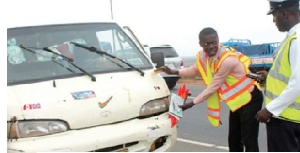 DVLA plans to make driving tests easier for those who cannot read and write
DVLA plans to make driving tests easier for those who cannot read and write
The Driver and Vehicle Licensing Authority (DVLA) says it will, this year, revise its testing regime to make it friendlier for those who cannot read and write.
As part of the reforms, the DVLA will translate all the test questions into local languages by voice overs, as well as increase road signs education.
“If we don’t make it friendly for our compatriots who were unfortunate not to have classroom education, they will drive anyway and the consequence may not be a palatable one.
“Although the law says drivers should be able to read and write, we are sensitive to their jobs and how people feed their families. They are drivers and they have been driving for years, we can’t take away their livelihoods,” the Chief Executive of the authority, Mr Kwasi Agyeman Busia, told the Daily Graphic.
He said it was important to find alternative ways to ensure that drivers did not resort to the use of fake licences.
“We have to find ways to let them use the real licence instead of the fake ones. This is our concern. The administration of the whole computer based examination is being reviewed.
The questions will be reduced from 30 to 20, and then a lot more road signs and audio voice over will be introduced,’’ he indicated.
He was, however, quick to add that the current smart card licence would be difficult to clone, but clearing them from the system was a gradual process.
The DVLA, in 2008, introduced a regulation that demanded that only those who could read and write would be given a driver's licence.
The move was to ensure that all drivers in the country could understand the rules and regulations easily and also undertake the DVLA examinations without any assistance.
Under the 2008 regulation, the licences of illiterates who already possessed driver’s licences would not be renewed.
However, the decision fell through because of certain factors such as the lack of strict enforcement and the easy procurement of fake licences.
Ghana’s illiterate population.
According to Ghana’s 2010 Population and Housing Census, there were approximately 5.3 million Ghanaians who had never been to school.
Out of the number, 2,058,897 were males who formed a greater number of commercial drivers in Ghana.
Elsewhere
In other jurisdictions, an applicant who cannot read or write in the English language, or in any foreign language is still eligible to take the written test.
In the state of Illinois in the United States, for instance, the Driver Services Facility supervisor or designee may provide or recommend the use of an interpreter for the applicant's language, if an interpreter is readily available. If an interpreter is not readily available, it will be the responsibility of the applicant to obtain the services of an interpreter.
GPRTU commends
When contacted, the National Vice-Chairman of the Ghana Private Road Transport Union (GPRTU), Mr Robert Sarbah, commended the authority for the initiative.
He said there were many people who could not read and write, and it was a welcome news, since the current testing system was not illiterate friendly.
He observed that there were people interested in commercial driving but because they were unable to read and write, they turned to social vices to earn a living.
“The number of vehicles on our roads has increased significantly, so if you cannot read or write, it makes you more vulnerable,” he said.
While stating that the union was yet to be consulted on the initiative, Mr Sarbah was optimistic that the DVLA would consult the union for its input.
Background
The DVLA, on April 26, 2012 introduced the Computer Based Technology (CBT) system for theory driving test to replace the manual driving test system that had been used over the years, as well as manual for basic driver training.
The CBT was expected to promote accountability and transparency in the administration of tests to win the confidence and total support of stakeholders, while the manual was to help standardise and better train drivers to help curb the increasing spate of road crashes recorded in recent times.
The project, the first in West Africa, is a collaboration between DVLA and Fleet Technologies Limited, an on-line information provider.
The written theory test was fraught with problems, including fraud, impersonation and leakage of questions, improper storage of questions, human interference and influences hence the introduction of CBT.
Goro boys writing tests
However, in March 2016, the DVLA had to resort to the installation closecircuit television cameras (CCTVs) at the various examination rooms in its operational areas to ensure that only qualified applicants would partake in the licensing exams.
Apparently, middle men, popularly referred to as “goro boys”, who operate illegally at the offices of DVLA, were impersonating applicants to write the computerised licensing exams for a fee.
The introduction of the electronic licence regime by the DVLA was to discourage the activities of such men who were often alleged to be at the centre of issuing fake driver’s licences to the unsuspecting public at exorbitant costs.
With that limiting their influence in the issuing processes, they have adopted modalities to assist would-be applicants who failed the computerised tests at the first trial by charging them fees to enable them to write and pass the exams for them.
Anger
On June 1, 2015, members of Committed Drivers Association embarked on a nationwide strike to protest against a number of government plans in the transport sector, including one by the DVLA to get all commercial drivers pass through accredited driving schools and write the computerized tests for any upgrade.